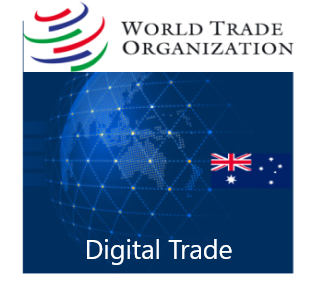Following the final negotiating round for the year on 20 December 2023, at the World Trade Organization (WTO) in Geneva, Members of the ‘WTO Joint Statement Initiative on Electronic Commerce’ (JSI) have reached substantial conclusions on a number of global digital trade rules.
Digital trade is not just about buying and selling goods and services online, it is also the transmission of information and data across borders. It relies on the use of digital technologies to facilitate trade and improve productivity, for example through simplified customs procedures.
The JSI on E-Commerce co-convenors, namely, Australia, Japan and Singapore, have also released a joint statement to accompany this announcement. The JSI now has 90 participants, accounting for over 90% of global trade and representing all major geographical regions and levels of development.
The JSI’s conclusions covered three broad areas of (a) digital trade facilitation; (b) open digital environment; and (c) business and consumer trust.
In 2020, digital trade represented 25% of total global trade, or just under US$5 trillion, and continues to grow at a rapid pace. These rules will facilitate the ability of JSI participants to ride the rapid growth of digital trade and deliver tangible benefits to governments, businesses and consumers.
Looking ahead into the New Year, JSI participants will focus on resolving issues including Customs duties on electronic transmissions, Development, Electronic payments, ICT products that use cryptography, and Telecommunications services.
They aim to conclude negotiations in a timely manner in 2024.
Australian Minister for Trade and Tourism, Don Farrell, said: “We have an opportunity to set a strong baseline of digital trade rules with this historic deal.”
Australia supports crucial WTO agreements on goods, services and intellectual property, including the Agreement on Trade Facilitation. We also support the adoption of agreements that encourage WTO members to take on further digital trade and trade facilitation commitments.
Another priority is making permanent a WTO moratorium on imposing customs duties on electronic transmissions, which would increase the costs of goods and services purchased online and may act as a disincentive for business and consumers to engage in e-commerce.
While flows of information and data may not always be for profit, they are essential enablers of digital trade. The digital economy more broadly creates opportunities for SMEs and encourages innovation in their products and services, access to market intelligence, talent, financing and increasing competitiveness in local and global markets.
Follow this link for a copy of Australia’s Digital Trade Strategy. It is intended to provide a framework for Australia to maximise economic growth by shaping an enabling environment for digital trade. It guides Australia’s practical action as a leader in digital trade, informing our work to develop digital trade rules to deliver commercial benefits and push back against digital protectionism.
Read our related article: Simplified Trade System.
For more information about global trade and shipping – whether ‘digital,’ or in the broader physical sense – contact us here at Colless Young. As licensed Customs Brokers and Freight Forwarders we offer correct, professional advice on all your import and export transactions. We are based in Brisbane and provide a complete range of logistics services, both airfreight and sea cargo, through all Australian ports and airports.

